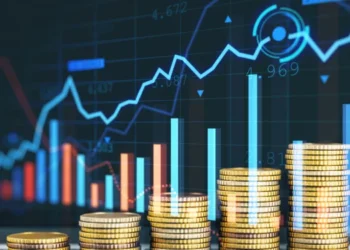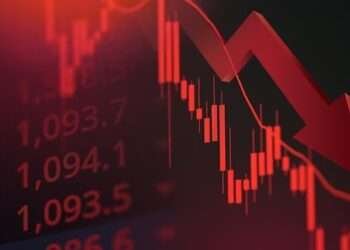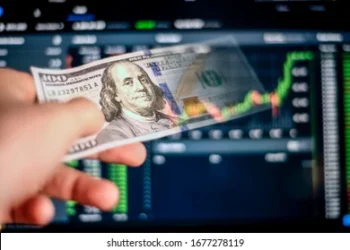Ms Gifty Annor-Sika, a financial market expert and the President of Women in Forex Ghana, has given her perspective on the recent new loans contracted by the government of Ghana and subsequently approved by the Parliament of Ghana, noting that the increase in the country’s debt stock has effects on the stock market – both negative and positive.
In an interview with the Vaultz News, Ms Annor-Sika explained that expansionary economic policies like borrowing by governments leads to increases in the stock market because it generates increased economic activity.
“Yes. These loans will have pluses and minuses effects on the stock market depending on the way you look at it. Basically, this is an expansionary policy because with these loans hitting the government’s account, the government will spend it in the economy, which will lead to increases in aggregate demand and employment. This translates into more spending and higher levels of consumer confidence. This subsequently will lead to a rise in stocks prices, as these interventions lead to increased sales and earnings for corporations.
“The expansionary policy is quite effective in stimulating economic activity and consumer spending. It is simple in its transmission mechanism. The government borrows money or dips into its surplus and gives it back to consumers in the form of a tax cut, or it spends the money on stimulus projects – as in the case of this loan facilities.”
Ms Gifty Annor-Sika
The Negative Consequences of the Loans on Stock Prices
However, on the hindsight, the analyst noted that Government borrowing can influence both the discount rate and the benefits realized by stock market participants. “It is through these two channels that the impact of public sector debt on stock valuations could potentially manifest itself”.
“However, as we looked at the positive side of the conversation of the debt accumulation, many studies also showed that stock prices tend to decrease as governments become more and more indebted. Depending on the econometric specification, increasing public debt by 1% of GDP leads to a ceteris paribus drop in the stock market index.
“The rationale for this unfavourable market reaction, perhaps may be driven by changes in the risk premium component of the threat of government insolvency looming larger at higher levels of indebtedness.”
Ms Gifty Annor-Sika
Ms Annor-Sika further explained that increasing the stock of public debt exerts an upward pressure on interest rates and results in a larger tax burden in the future. “I believe that these two by-products of rising debt obligations are responsible for stock price declines”.
Ghana’s Debt Situation
By the year 2000, the government of Ghana had borrowed so much that the country was in debt distress. It then subscribed to the Heavily Indebted Poor Countries initiative of the International Monetary Fund and World Bank (HIPC). Consequently, much of the country’s external debt of over US$4 billion at the time was written off by creditors. By the time the initiative ended in 2006, Ghana’s total public debt stock was US$780 million (25% of GDP).
After the Heavily Indebted Poor Countries initiative ended in 2006, the public debt stock has largely been driven by the continuous accumulation of budget deficits, the currency deprecation, and off-budget borrowings. Between then and now, Ghana’s debt stock has grown astronomically for three main reasons, beyond the normal drivers.
First is the country’s energy sector debt. This is debt owed to the country’s power producers and suppliers. It has been accumulated largely by Ghana’s state-owned enterprises that struggle to generate enough internal revenue to pay their loans. In 2021, for instance, the government provided a $3 billion bailout.
Second is the financial sector clean-up exercise undertaken by Ghana’s central bank. Between 2017 and 2019, the Bank of Ghana revoked the licences of some banks, savings and loans, micro-financial institutions, finance houses, and investment institutions due to their insolvency and financial malpractices. The government had to raise another $3 billion in bonds to pay customers of the defunct banks and financial companies.
Thirdly, like many countries in the world, COVID-19 has had a serious impact on the Ghanaian economy due to lockdowns, border closures, restrictions in movement, and the fall in crude oil prices. The economic restrictions resulted in a fall in revenue of US$2 billion, while COVID-19 expenditures increased total government expenditure by US$1.7 billion, giving a total fiscal impact of almost US$4 billion in 2020.
Meanwhile, the current rigidity in the Ghanaian budget makes it impossible for the government to do anything without borrowing.
For the government to be able to meet the remaining statutory expenditure and all other discretionary expenditures, it will have to borrow.
Approval of Seven Loan Facilities
It can be recalled that Parliament reconvened last week for an urgent business and approved seven loan agreements totalling $750 million to enhance public sector reforms, food security, COVID-19 response measures and digital acceleration agenda.
The facilities, which were approved during the emergency sitting, were an on-lending agreement between the Government of Ghana (GoG) and the International Development Association (IDA) of the World Bank Group for an amount of $150 million to finance the West Africa Food System Resilience Programme phase two under the Multipurpose Programme Approach.
Also approved were a €170 million between the GoG and the Development Bank of Ghana for the establishment of the Development Bank of Ghana, a $60.6 million agreement between the GoG and the IDA of the World Bank Group as a third additional financing for the Ghana COVID-19 emergency preparedness.
Again, a $30 million response project and an agreement between the GoG and the Government of the Republic of Korea [acting through the Export-Import Bank of Korea-Government Agency for the Economic Development Cooperation Fund (EDCF)], an agreement between the GoG and the IDA of the World Bank for an amount of $150 million to finance the Primary Healthcare investment Project and a $150 million agreement between the GoG and the IDA to finance the Public Financial Management for service delivery project, were all approved.
Additionally, the House approved a financing agreement between the GoG and the IDA for an amount of $200 million to finance the Ghana Digital Acceleration Project.
These new loans met a fierce resistance from the minority side of the house who argued that due to the unsustainable debt situation the country finds itself, there is no need to add more. However, the majority side managed to have the loans approved.
READ ALSO: New World Bank President to Champion Fight Against Extreme Poverty- Board of the World Bank Group























